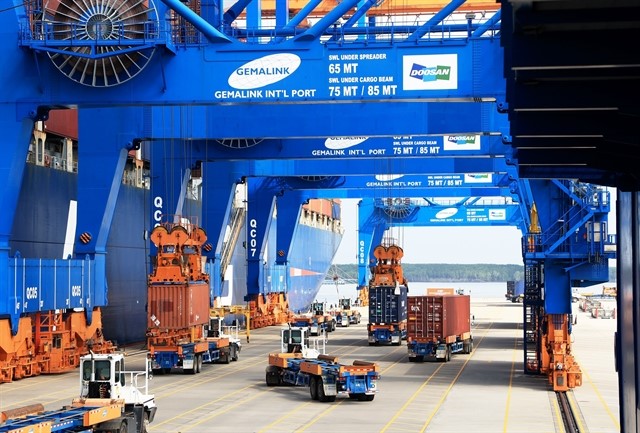A B2B matching between Vietnamese and Arab enterprises was held in Hà Nội on Thursday to seek ways to promote bilateral trade and investment.

A B2B matching between Vietnamese and Arab enterprises was held in Hà Nội on Thursday to seek ways to promote bilateral trade and investment.
In his opening remarks, Trần Thanh Hải, deputy director general of the Agency for Foreign Trade under the Ministry of Industry and Trade, noted that Việt Nam is increasingly integrating into the global economy with 17 signed free trade agreements (FTAs).
In its economic development process, Việt Nam places great importance on attracting and effectively utilising foreign direct investment (FDI). The Vietnamese Government has implemented various measures to improve its investment environment and facilitate foreign businesses in investing and operating in the country. These efforts, along with effective FDI attraction measures, have significantly boosted FDI inflows into the nation, reaching US$438.7 billion as of the end of 2023, positioning it among the top 20 nations in the world for FDI attraction, Hải stated.
The huge market potential, favourable policies and mechanisms, and impressive socio-economic achievements have turned Việt Nam into an important partner in Asia for Middle Eastern countries. However, currently, investment from the Middle East accounts for less than 1 per cent of total FDI projects in Việt Nam, with capital representing only 0.21 per cent of the total, he noted.
Meanwhile, the economic and trade cooperation between Việt Nam and Middle Eastern and African countries has continued to develop positively, with bilateral trade increasing more than tenfold since 2005, from $2 billion in 2005 to $20.8 billion last year.
According to the official, cooperation in these fields holds significant potential thanks to the complementary advantages and needs of both sides in areas such as energy, infrastructure, real estate, tourism, industry, and processing.
At present, Việt Nam's exports to the Middle East and Africa mainly focus on products such as rice, coffee, pepper, and aquatic products, Hải said, adding that there remains an ample room for the country to ship apparel, footwear, electronics, and household goods to these markets, especially those with young populations and a growing middle class.
On the contrary, Việt Nam can import oil, natural gas, and petrochemical products from the Middle East to serve domestic economic development needs.
In addition, Middle Eastern and North African countries have a high demand for imported Halal food due to limitations in domestic agricultural production. With a Muslim population exceeding 40 per cent, their consumption of Halal products, particularly processed food, cosmetics, and pharmaceuticals, is steadily increasing.
In the logistics and maritime transport sectors, Việt Nam, with its strategic location, has the potential to become a hub for goods transit between Asia and the Middle East, Hải went on. He added collaborating with leading logistics companies in the region, such as DP World, a premier business hub of the Middle East located in Dubai, of the United Arab Emirates, will enhance supply chain efficiency, and improve connections between Việt Nam and Middle Eastern and North African countries.
Bassam Tabajah, head of the Arab entrepreneurs' forum, said Arab countries have obtained numerous achievements over the past years, especially in such areas as renewable energy, infrastructure, and technique, and they wish to further extend this success in Việt Nam.
The Halal industry boasts considerable opportunities and potential, and Arab countries hopes to cooperate more closely with Vietnamese businesses in the future, he said, noting that they also want to boost partnerships in many other fields like infrastructure, export, and import. He expressed his hope for fruitful cooperation in the coming time. — VNS





